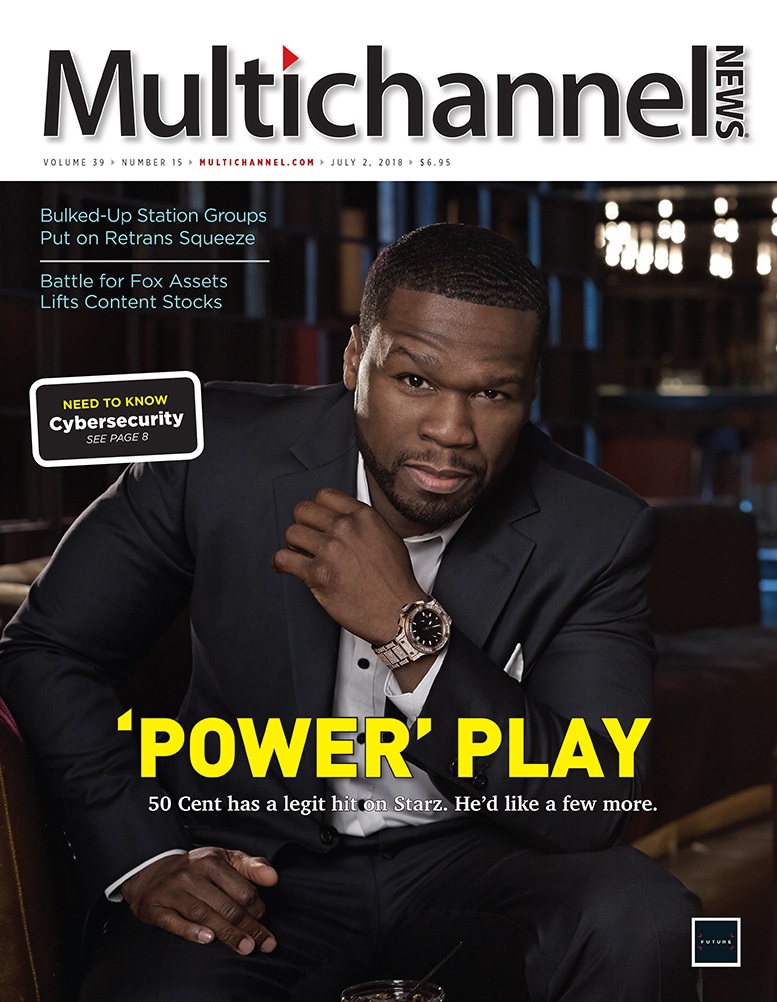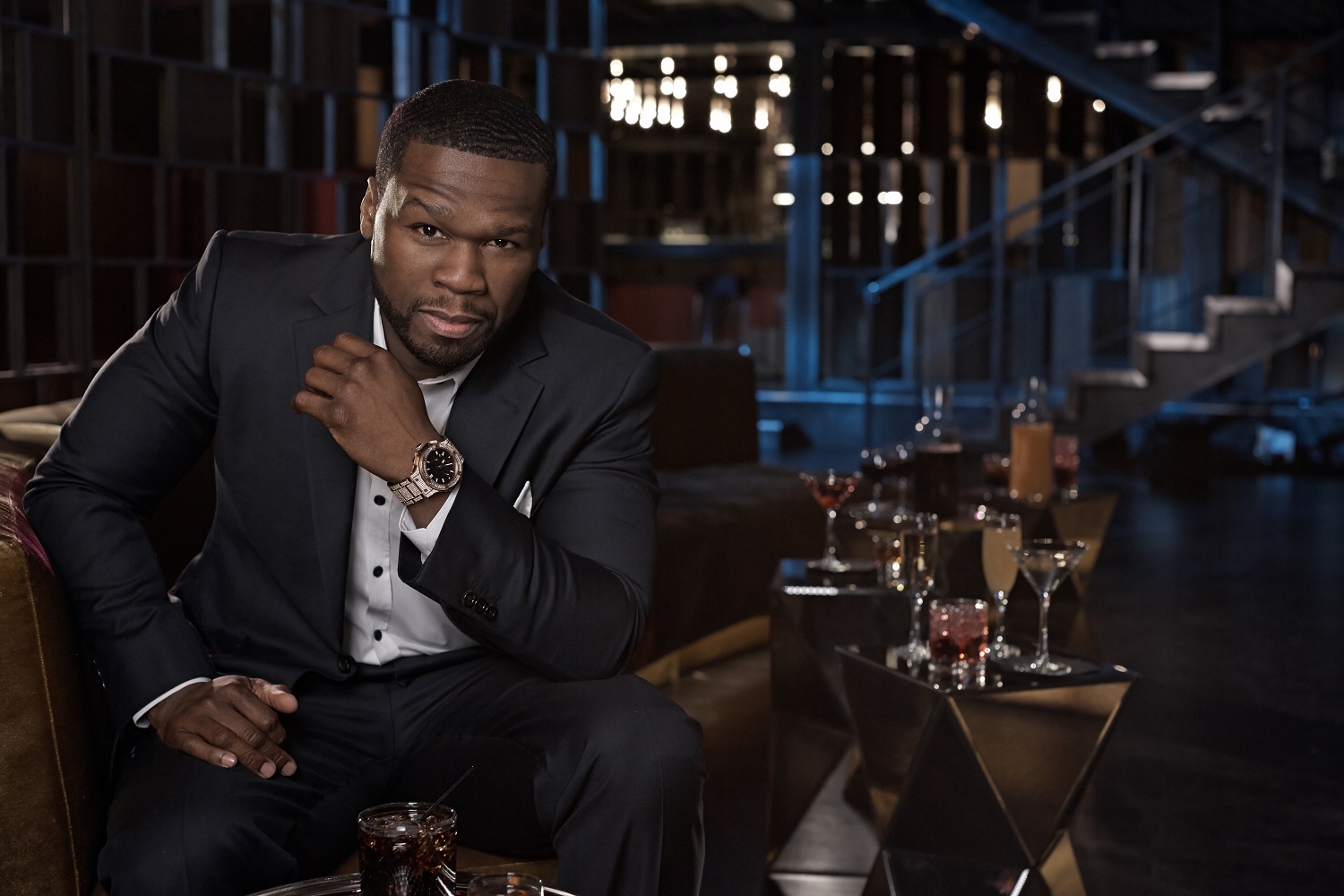TV’s ‘Power’ Forward
The smarter way to stay on top of the multichannel video marketplace. Sign up below.
You are now subscribed
Your newsletter sign-up was successful
The Fifth Season of Power, the edgy street drama on Starz, is underway. The series depicts the glamorous lifestyles of the rich in Manhattan, juxtaposed with dodgy figures in the international drug business. 50 Cent is an executive producer and is in the cast as well, playing Kanan, thuggy frenemy to main character James “Ghost” St. Patrick, who is working to go legit after a heady run in street crime.

The fourth season of Power averaged 9.3 million multiplatform viewers. Created by Courtney A. Kemp, the show has averaged 7.4 million viewers throughout its run, growing each season. “It’s our most-watched show,” Starz president and CEO Chris Albrecht said.
In this golden age of TV, what makes a hit is determined by the wattage of the star, and few shine like Queens-born Curtis Jackson, better known as 50 Cent. The rapper, who exploded on the hip hop scene with the album Get Rich or Die Tryin’ in 2003, is now rocking TV, and is the engine behind Power’s success. “He’s smart, he’s focused on business, he’s creative and he’s hard-working,” Albrecht said. “He really understands the industry, and understands the audience. This guy is the consummate professional.”
Albrecht describes 50 Cent as “an idea machine and a talent magnet.” He has a number of shows in development at Starz, including BMF, short for Black Mafia Family, and Vanguard. He’s also executive producer on The Oath at Sony Crackle, that network’s most watched new original drama that explores the world of gangs and secret societies within police ranks.
Kemp calls him “the heart and soul of the show” and a “hands-on” executive producer. “He reads every script, watches every cut, and has strong relationships with the actors and the crew,” she said. “He’s the crew’s biggest cheerleader and everyone loves working with him. He’s early every day he’s required on set — never been late, no entourage, no attitude.”
Head of G-Unit Film and Television, 50 Cent will direct the Power season six premiere. He picks his projects carefully: “I’m a guy who’s really conscious of only wanting to be a part of projects that have that artistic integrity and that you’re proud of later.”
Days before season five of Power kicked off, 50 Cent spoke with Multichannel News in his Midtown Manhattan office about that show’s allure, his other projects, and why Power might be more of a hit than Game of Thrones. An edited transcript follows.
The smarter way to stay on top of the multichannel video marketplace. Sign up below.

MCN: The subway I rode over here was decked out in Power advertising. What’s that like for you, a guy from New York, to see a subway ad or a billboard for your show?
50 Cent: It’s great. Even with music [before], seeing billboards and stuff like that, it was like, yoooohhhh — a different kind of excitement. Now it’s the subway, and the last season, we had a lot of [ads on] tour buses. The connection to New York is important. We decided to make it a character in the show, instead of just making it a location. New York is a melting pot — you find every kind of person here.
MCN: What about the new season has you excited?
5C: There’s no one who can’t get hurt. So it is really capturing the lifestyle. The person that was least expected to get killed, got killed last season. The Raina character, she was the only innocent person in the whole show. [Laughs.] Like, completely innocent, she was the only one.
MCN: I can’t believe you’re laughing! Raina got killed!
5C: It was crazy! But Courtney, she’s really calculated. It’s a skill set to think that far in advance. When we started, she had the season arc until season six. Now it’s just putting the colors in and doing the details of it.
MCN: I want to get a better idea of what you bring to Power as an executive producer. Are you weighing in on the scripts?
5C: I read [the scripts] before we start, get the season arcs early on, each character’s arc, and then I communicate with the talent. I spend more time troubleshooting things before they actually get bad between the acting talent and the production itself. They’ve been playing these characters for five years. I feel like they know the character as well as the writer does, and they don’t understand where it’s going a lot of times. Sometimes the actors have their own ideas of how they would do something or how they feel at different points. They don’t want to say it to Courtney, because she’s the boss. If you say it, and it doesn’t go over the right way, then she has an issue with you. And you don’t want that ... You don’t want to go to work under those circumstances.
For my character, I’ll ask, can I say this like this? Because the way it was written, it may be difficult for me to get it out. It’s just word changes; I’m not trying to alter what’s actually happening. If I change it around to make me more comfortable, I don’t feel like I’m actually acting. I’ll go sit in the writers’ room. I want to hear how they’re thinking when they’re putting it together so I can make legitimate arguments. Having me play a recurring character gives [actors] comfort with talking to me, [rather] than talking to an executive. They think, “I can tell him, he’ll understand, because he’s under the same circumstances as an actor.”
MCN: Why has the show been successful?
5C: People identify with the flaws in the characters. And the pacing of it makes it unique. The first season was a lot slower because Courtney was establishing the characters. Then it sped up in the second season.
And I think we’ve achieved what a lot of programs haven’t, [defying] the laws of cinema, the laws of Hollywood, that say the elite can’t die. Bruce Willis don’t die, Sylvester Stallone can hang off a chopper [and not die]. Moving trains, all these things can happen and they will be fine.
MCN: So with your various businesses — music, vodka, clothing — where does the TV work rank?
5C: You see the money they give you in television — oooo, it’s exciting. It’s good. When that happens, you go, “Whoa, wait a minute — I gotta prioritize things a little different.” I’m making a lot of money from television. I have three projects in development at Starz.
I have The Oath at Sony Crackle; we’re approaching season two. I have a few other projects just floating, but I have some things right now that I know are potentially bigger than what I’m working on. I have BMF, Vanguard and a third series at Starz that’s really good.
MCN: Do you feel like Power has gotten fair treatment from the awards people?
5C: No. Absolutely not. I didn’t care about the awards in my music career. I had the largest debut hip hop album, and my first television project is the highest rated show on the Starz network. Now, all of a sudden, they’re listening a lot harder when I’m talking to try and figure it out. It’s difficult to hit the bull’s-eye. The targeted audience demo, boom! Got it. After Power comes out like that, the executives working on Empire at Fox borrow from the marketing to [launch] it. And to be honest with you, if I was an executive at Fox, I would’ve borrowed from the marketing also. It’s not reinventing the wheel, we want to make something that works.
MCN: Does it bother you that the awards people have not given Power more respect?
5C: It does. It made me focus on the numbers. If they don’t acknowledge you, then you go, “OK, I’m gonna make it the biggest show.” They gave me additional energy for marketing purposes. Because if you know you created something that’s great, and then people just decide not to acknowledge it, you go, now I’m gonna promote it and make it the biggest show. Like, I have nothing to do but this now.
Do you know how difficult it is to make the No. 1 show? The only thing you could say is ahead of it is Game of Thrones. But that’s not as big a hit as Power is for Starz because, if you look at the Game of Thrones effects budget, how much money they’re spending just on effects — I’d rather be the Starz network and have Power than spend the money that has to be spent to have the hit over there.
MCN: Have you had a mentor in the television business?
5C: I looked at [film producer] Avi Lerner’s model initially. He wouldn’t even read the script, [but would ask], Will Stallone do it? He knows what he can sell. Without a frame of film being shot, he knows what he can actually get from the territories that he is selling it to.
MCN: If you could change one thing about television, what would it be?
5C: No one has ever delivered a script and [the network] said, this is fucking great — just leave it. Music — simplicity is the key to your hit. So, “Go shorty, it’s your birthday,” that’s not rocket science. It just comes out organically when the music is in front of you. You write your idea, take the time to get the idea out, and it’s right! And you submit it, and they feel like it’s their job to change it. So they’ve got to change it. They give you notes and they change it around.
MCN: What are you watching?
5C:Billions. Without being in the financial space, you can embrace the idea and make it real. The girl with the short hair [Asia Kate Dillon], she’s like a robot. It’s interesting, her choices in how to play the character.
MCN: What made you want to work in television?
5C: [Making a season of] premium cable is like making 10 films, 10 R-rated feature films. I would do network television. Obviously, it’s got great financial upside. But premium cable is as graphic as our culture is.
MCN: Since Power first premiered, do you feel like the white audience is more open to a show with a black cast than they were back in 2014?
5C: Absolutely. But I wasn’t trying to make a black show. I was just trying to make a great show.
Michael Malone is content director at B+C and Multichannel News. He joined B+C in 2005 and has covered network programming, including entertainment, news and sports on broadcast, cable and streaming; and local broadcast television, including writing the "Local News Close-Up" market profiles. He also hosted the podcasts "Busted Pilot" and "Series Business." His journalism has also appeared in The New York Times, The L.A. Times, The Boston Globe and New York magazine.

